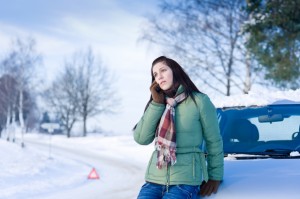Car safety tips for winter
September 26, 2014 The winter is slowly approaching, and it is time to start thinking about staying safe on the road as the temperature drops. So what do you need to know to stay safe through the winter months? Here are some key tips to keep in mind, particularly if you have recently passed your test and have not experienced driving in bad weather conditions before:
The winter is slowly approaching, and it is time to start thinking about staying safe on the road as the temperature drops. So what do you need to know to stay safe through the winter months? Here are some key tips to keep in mind, particularly if you have recently passed your test and have not experienced driving in bad weather conditions before:
- always prepare properly for any car journey you make in the winter, even if you are going on a journey you know well, like driving to work;
- pack suitable items with you in your vehicle. This could include a mobile phone and a spare one that is fully charged, blankets, a shovel for the snow, a basic first-aid kit, snow socks, the emergency number for your breakdown cover, a torch, extra clothing and anything else you think you may need such as water and non-perishables should you get stuck somewhere for several hours;
- check your car over before you set off, and do this every time you head out. This could include cleaning the lights and checking the tread in the tyres, the coolant levels in the engine, the batteries to make sure they are in good condition, and the oil levels;
- driving conditions can become worse very suddenly in the winter, so always drive carefully, and that means slowly. Get into the habit of slowing down, especially when there is a risk of ice or snow on the roads. By simply driving slowly, you will stay safer;
- know how to brake on slippery surfaces. Braking distances are much longer in the rain or when ice is on the road, so brake slowly and in a controlled manner;
- heavy fog can often be a problem in winter, so use headlights and fog lights when visibility is low. You may want to dim your headlights so you don’t blind any other drivers;
- if your windscreen becomes dirty, take the time to stop and clean it. A dirty windscreen can dazzle you in the sun, and it can also affect your visibility, making driving more dangerous. Make sure you also clean your lights at the same time if they have become dirty so that other road users can see you clearly;
- be extra aware of cyclists and other road users because the bad conditions may also affect their driving. Although you should always be aware of other people on the road, it is more important than ever during the winter months;
- always follow the basic and legal advice that you follow during the rest of the year, such as not eating or drinking while driving, not using your phone, and always using your seatbelt;
Finally, if the weather is really bad, it may just be better to stay inside. Sometimes this cannot be helped and you have to go out, but always think twice before heading out in your car because sometimes it really is not worth it.